HELL IS THE RECEPTACLE OF ALL THE MORAL FILTH OF HUMANITY
HELL IS THE RECEPTACLE OF ALL THE MORAL FILTH OF HUMANITY
We don’t discuss the dogma of hell as much as we should. And yes, it is a dogma. In fact, we don’t discuss the “Four Last Things” very much. It’s not fashionable. The thought of it is unpleasant. Yet, the desire to NOT end up in hell, has inspired many Saints to live holy lives.
If you are not used to reading about hell, you may experience skepticism. Hopefully you experience fear and a strong desire to not end up in hell. May it please God you cultivate a real hunger for souls.
Imagine all the sins that you try to avoid. Now imagine all of them being concentrated in one area.
This is what hell is.
In the Dogma of Hell, by Rev. Father Francois Xavier Schouppe, S.J., we find this very scary description of hell:
“Hell is the sink of the world and the receptacle of all the moral filth of humanity.
There, impurity, intemperance, blasphemy, pride, injustice and all the vices which are like the rottenness of souls, are found heaped up. To this moral filth a corporal stench is added more insupportable than all the stenches of hospitals and corpses.
If the body of a damned person, says St. Bonaventure, were deposited on the earth, that of itself alone would be sufficient to make the earth uninhabitable; it would fill it with its infection, as a corpse that might be left to rot in a house would infect it all the way through.”
“Another torture of hell is the horrible society of the devils and the damned. There are some wretched sinners who, seeing plainly that they are walking toward Hell, are comforted by saying, “I shall not be there alone!” Sad consolation! It is that of the convicts sentenced to wear irons together in the galleys.
Still it is intelligible how a convict finds a certain life in the company of his kind. Alas! It will not be thus in Hell, in which the damned will be mutual executioners. “There,” says St. Thomas, “the associates of his wretchedness, far from alleviating the lot of the damned soul, will make it more intolerable for him.” (Suppl. 9, 86, A. 1). The society of even those persons who on earth were their best friends is insupportable to the damned in Hell. They would esteem themselves happy to have tigers and lions for companions, rather than their relatives, brothers, or their own parents.
Do you wish to see the poverty of hell and the privations that are suffered there by those who made the goods of this world their god? Consider the wicked rich man of the Gospel.
Accustomed during his life to eat delicate meats served in silver utensils, to drink exquisite wines in goblets of gold, to wear purple and fine linen, having become an inhabitant of Hell, he found himself brought down to the last extremity of need. He who refused poor Lazarus the crumbs from his table, was obliged to beg in his turn. He asks, not delicacies, but a drop of cold water, which he will be happy to receive from a leper’s finger. Now, this drop of water is refused to him. Has not the Savior said: “Woe to you that are rich, for you have your consolation. Woe to you that are filled, for you shall hunger.” (Luke 6:25). “
“There is no light,” writes St. Teresa (Autobiography, Chapter 25), “in the eternal pit, only darkness of the deepest dye; and yet, O mystery! Although no light shines, all that can be most painful to the sight is perceived. Among those objects which torture the eyes of the damned, the most frightful are the demons, who reveal themselves in all their hideousness.
St. Bernard speaks of a religious who, being in his cell, uttered all of a sudden frightful cries, which attracted the community. He was found beside himself and uttering only these sorrowful words: “Accursed be the day I entered religion!” Terrified and troubled by this curse, the cause of which they did not understand, his brethren questioned and encouraged him and spoke to him of confidence in God. Soon, being quieted, he replied, “no, no, it is not the religious life that I should curse. On the contrary, blessed be the day I became a religious! My brethren, do not be astonished at seeing my mind disturbed. Two devils have appeared to me; their horrible appearance has put me out of my senses. What monstrosity! Ah! Rather all torments than again to endure the sight of them!”
“A holy priest was exorcising a demoniac, and he asked the demon what pains he was suffering in Hell. “An eternal fire,” he answered, “an eternal malediction, an eternal rage, and a frightful despair at being never able to gaze upon Him who created me.” “What would you do to have the happiness of seeing God?” “To see Him but for one moment, I should willingly consent to endure my torments for 10,000 years. But vain desires! I shall suffer forever and never see Him!”
“One day, a holy soul was meditating upon Hell, and considering the eternity of the pains, the frightful “always… never,” she was thrown into complete confusion by it, because she was unable to reconcile this immeasurable severity with the divine goodness and other perfections. “Lord,” she said, “I submit to Thy judgments, but do not push the rigors of Thy justice to far.”
“Do you understand,” was the answer, “what sin is? To sin is to say to God, I will not serve Thee! I despise Thy law, I laugh at Thy threats!” “I understand, Lord, that sin is an outrage to Thy Majesty.” “Well, measure, if you can, the greatness of this outrage.” “Lord, this outrage is infinite, since it attacks infinite Majesty.” “Must it not, then, be punished by an infinite chastisement? Now, as the punishment could not be infinite in its intensity, justice demands that it be so at least in its duration. Accordingly, it is the divine justice that wills the eternity of the pains: the terrible ‘always,’ the terrible ‘never.’ The damned themselves will be obliged to render homage to this justice, and cry out in the midst of their torments: ‘Thou art just, O Lord, and thy judgments are equitable.’ (Psalm 118: 137).”
Very scary imagery.
Let us resolve to live holy lives and make use of the sacraments, often, so that we can avoid hell.
SOURCE
“The Dogma of Hell, Illustrated by Facts Taken from Profane and Sacred History.” by Rev. Father Francois Xavier Schouppe, S.J.
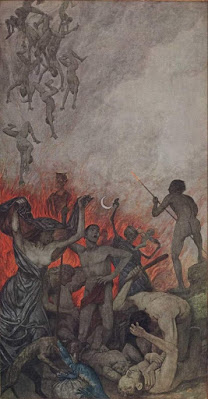

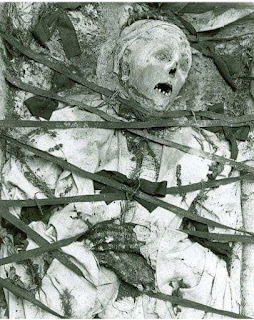
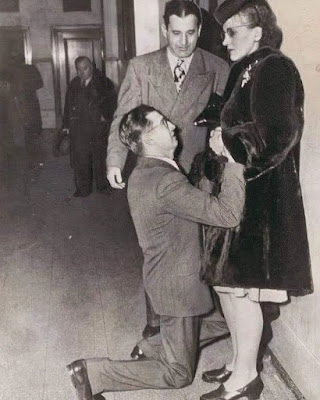
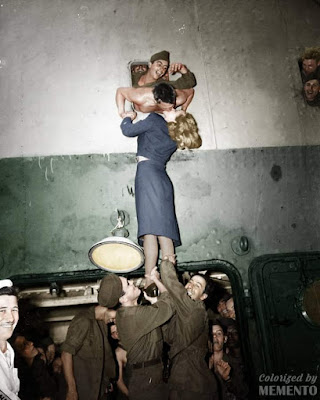
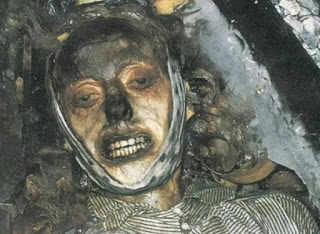



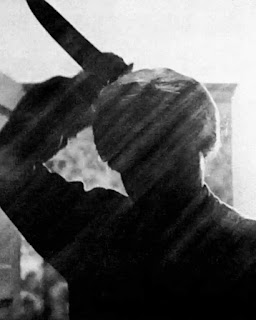

Comments
Post a Comment